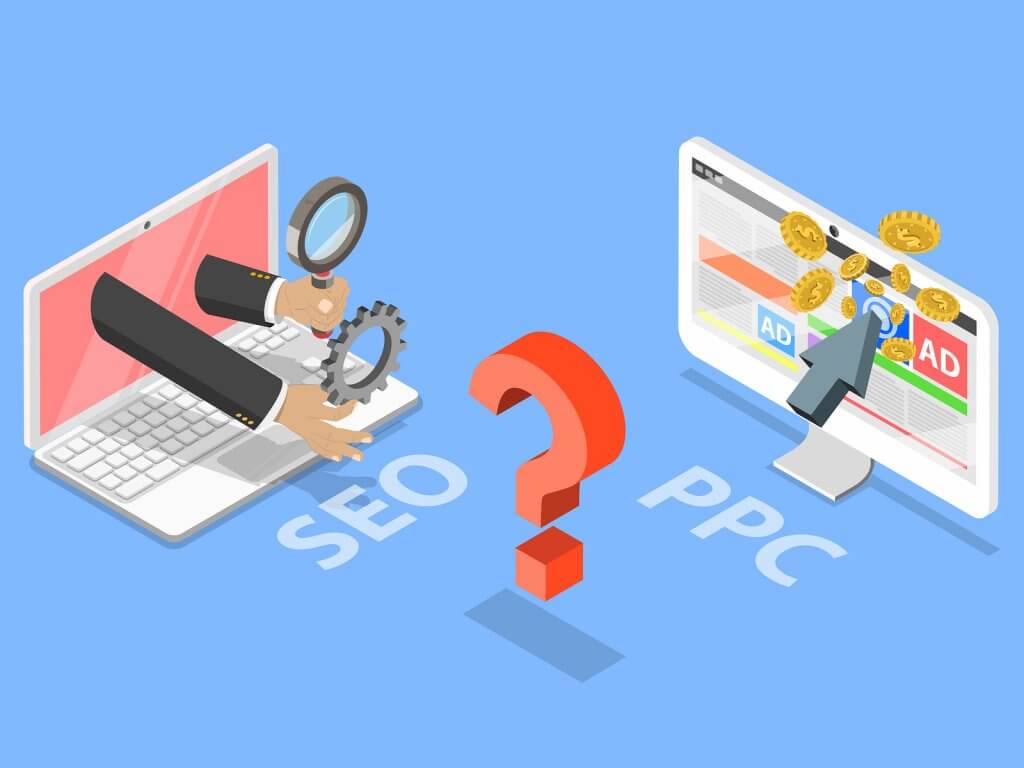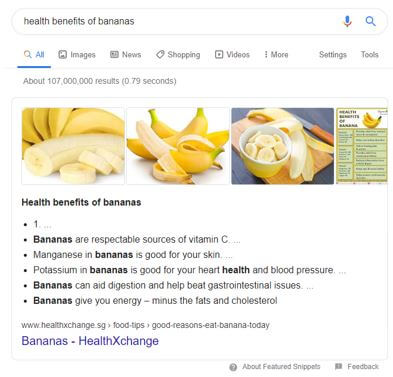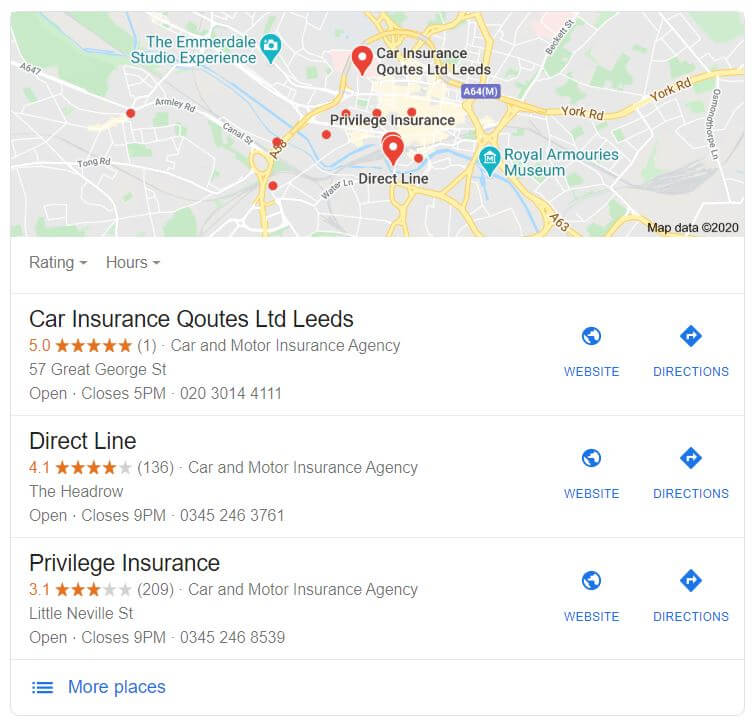SEO or PPC? Which Is right for you?
If you’re considering marketing your product or service online, two of the main digital marketing disciplines that you will come across are SEO and PPC. This raises the question of which digital marketing method you choose, and which one is better?
In this blog, I will run through seven of the main differences between SEO and PPC. But first, we need to look at what SEO and PPC are. I will be looking at what they both are in relation to advertising on Google seeing as though this is the most popular search engine that is used.

What is SEO?
Search Engine Optimisation (SEO) is the process of having your business’s listing appear on a search engine to obtain traffic without paying the search engine.
This is done by putting out signals that tell the search engine what your business is about and what kind of searches it should show your listings on.
What is PPC?
Pay Per Click (PPC) on Google is the process of having your website’s listing show on Google’s search engine. However, unlike with SEO where the advertiser would put out signals to influence Google to show their ads for certain listings, with PPC, the advertiser chooses keywords that they want to show for.
Also, unlike SEO, the advertiser will pay Google every time their listing is clicked. PPC uses an auction-based system where the highest bidder is likely to appear at the top of the page whereas, with SEO, the website that Google thinks is the most relevant and highest quality will appear on the top of the page for a particular search.
Difference 1 – Optimisation time
The first point to note is that the amount of time required to start getting traffic is very different with both SEO and PPC. With PPC, you can start appearing on the top of Google immediately after your ads have been approved. In contrast, with SEO, you would need to work hard to put out signals to influence Google to show you website’s listing. This process can take months or sometimes a year or two, depending on how good your SEO consultant is.
If you’re looking for a quick solution to start showing traffic, then PPC may be the option for you.
Difference 2 – Organic listings are trusted more
Seeing as though you can choose what keywords your ad shows on with PPC, in some instances, I’ve noticed better quality listings coming from organic listings. For this reason, some people tend to ignore paid listings and only click on organic listings. This is especially true in more technically savvy spaces where users may be more aware of digital marketing methods.
Difference 3 – Only PPC can truly get you on position 1
Google directly makes money from PPC clicks, whereas it doesn’t directly make money from organic clicks. It is, therefore, in Google’s interest for people to click on PPC listings instead of organic listings. For this reason, PPC listings often appear above organic listings.
Google may choose to have a maximum of four paid listing above organic listings. Even if you put in all the hard word and start appearing on position one of organic listings, you’re still going to be up to four paid listings from the top of the page in many cases. If you want to be on the absolute top of the page, then PPC is your only way to go.
Difference 4 – PPC listings will stop as soon as you stop investing in them
PPC requires the advertiser to invest in them continually. The moment you stop throwing money into Google PPC advertising, your ads will completely stop appearing on Google, and your PPC traffic will halt. In contrast, even though SEO takes much longer to start bringing in traffic, once you start getting traffic, this traffic should continue. Your optimisation efforts are banked, and you would expect to be getting traffic even after you stop investing in SEO.
In the long run, if you do SEO properly, it starts to work out cheaper than PPC, and you can get a lot of traffic from it. Whereas with PPC, you need to continue investing the same amount if you want your traffic levels to continue.
What’s more, PPC click prices are generally on the rise and tend to go up rather than down every year. This means that the amount you need to invest in PPC to continue getting the same amount of traffic may go up every year.
The main reasons for seeing a drop in traffic after you stop investing in SEO, is if a Google algorithm update happens and you get penalised for using practices that Google doesn’t like. Or, if a competitor is doing SEO much better than you are and overtakes you in the rankings.
If your goal is to have a long term, more sustainable form of digital marketing, then SEO may be the better option for you.
Difference 5 – You have more power to choose your traffic with PPC
SEO requires you to put out relevant signals and then hope that you start picking up traffic from the kind of keywords that you want to target. In contrast, PPC allows you to choose the type of traffic that you target.
Not only can you choose the keywords that you want your ads to show on, but you can also select the location, age group, gender, and device of the user who is searching to name a few. Being more granular with your targeting means that you have more power to get your ads in front of people who are more likely to be interested in your product.
Difference 6 – Organic listings can help more with branding and upper-funnel
PPC is more focused on providing an ROI. Therefore, seeing as though you pay for clicks, it may not be financially viable for you to target more branding related keywords. With SEO, you can put out content that will help to increase your rankings for your commercial keywords while also building your brand.
For example, for highly knowledge/research-based searches, Google may choose to show an answer box listing. In the below example, Google has not to show any PPC ads and only show an answer box listing at the top of the page. While the person searching for the benefits of bananas may not be likely to purchase directly after reading your content, they are now aware of your brand and may browse other areas of your website. This is an area that PPC doesn’t focus on as much

Difference 7 – PPC has better A/B testing capabilities
PPC allows users to split test various aspects and then improve performance. For example, you can split test the message in your ad copy to find the messaging that has the highest clickthrough. Increasing your clickthrough rate will mean that you can get more traffic to your site without paying more to appear on a higher position on the page.
Once you know what messaging resonates well with your customers, you can consider adding this messaging in your organic listings to improve their clickthrough rate as well.
It is also easy to split test landing pages by sending half of your PPC traffic to one page and the other half to the other page. Once you have some information on the type of pages that perform the best, you can start improving your website and increase your conversion rates.
PPC data can be used to help prioritise SEO optimisation tasks. To find out more, have a read of my blog on how to use PPC data to improve your SEO.
Difference 8 – Local businesses can benefit from Google’s map pack
Businesses looking for traffic from local users perhaps to increase their store footfall can optimise their SEO to appear on Google’s map pack. This is another area where businesses can obtain highly relevant traffic from people looking for local businesses.

Wrapping up
PPC and SEO have several benefits over the other. In general, if you’re just starting out, need traffic quickly as a proof of concept and have some finances to put towards advertising, then PPC is an excellent option to consider. As you get traffic from PPC advertising, you can analyse the traffic and improve your website accordingly. If you want a more long-term solution that is also going to build your brand, then SEO could be the option for you.
Serious businesses should be utilising both SEO and PPC, as each digital marketing platform has its own benefits. We live in a multi-channel world where users carry out research online using a variety of methods. This means that a business that can be found both organically and using Paid advertising has more chance of being found by a customer.
—